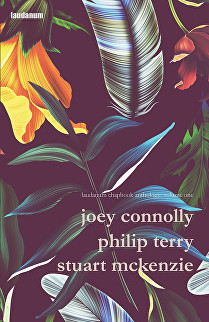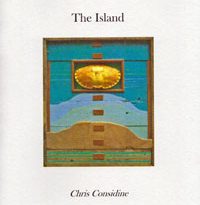Chapbook Anthology Volume 1: Joey Connolly, Philip Terry & Stuart McKenzie ed. by Tiffany Anne Tondut
– Reviewed by Jennifer Edgecombe –
Chapbook anthology: volume one is Laudanum’s second publication, and it binds three chapbooks together, featuring Philip Terry, Stuart McKenzie and Joey Connolly. Laudanum’s poetry publishing differs excitingly from the mainstream approach: in the foreword, editor Tiffany Anne Tondut shares her belief that combining several chapbooks of about ten pages makes the work more discoverable for readers, at a ‘more explorative level than single-poem anthologies.’ Tondut introduces the theme of ‘reinvention’ as the link between these poets, and states that ‘playfulness, vigour or perspective is communal’. This ‘communality’ allows the reader to move between the different styles and discover threads of intertextuality between them.
Philip Terry’s sequence, du Bellay, is a modern interpretation of Joachim du Bellay’s 16th century ‘outspoken’ sonnets, Les Regrets, written after du Bellay experienced a sense of disappointment when visiting Rome, a city he had held in high cultural regard. There are parallel disillusionments in Terry’s du Bellay: Terry, a University academic, sets his work within the confines of his workplace, and uses the romantic form of the sonnet to juxtapose his discontent with admiration for the subject he teaches.
The chapbook features fourteen sonnets, numbered/titled 2, 3, 11, 12, 21, 32, 50, 54, 68, 90, 95, 101, 107, and 115. If you work out the mathematical link between the numbers you will (pleasingly) discover that you are locked into an equation of the number 14: 14 lines, 14 sonnets, and a result that brings you again to the number 14. This ‘locked in’ form complements Terry’s subject, mirroring Terry’s love for creating poetry whilst seemingly enduring the complexities of academic existence. Bellay also used wordplay, and experimented with the structure of the sonnet. Terry and du Bellay both share ‘an unlucky passion’: du Bellay for his lover, and Terry for literature. Yet both suffer the disenchantment of what they once held in esteem, as this extract from Sonnet ‘3’ connotes:
Before I was voted Head of Department,
At the worst possible moment in the
University’s fifty year history,
I used to follow the steep path of Shakespeare and Dante,
Lifted up by the wings of poetry.
Now there’s a sign reading FOOTPATH CLOSED,
And I have a stuffed in-tray to keep me busy,
If the disappointment of visiting Rome induces in du Bellay a sense of nostalgia for the banks of the Loire in France, perhaps the same could be seen in sonnet ‘90’, in which Terry compares the women of his University town in Essex to the women from his home city of Belfast. In keeping with the content of Les Regrets, the satire is very much at the expense of the Essex women:
Do not think, White, that these Essex girls,
By hiding their love of self with a winning smile,
Or by hiding their fuck off faces beneath layers of slap,
Make me forget the girls of Belfast.The sweetness of the Irish, their lilting speech,
their neat dress sense, so devoid of show
The social satire within Terry’s poem is biting and brash, yet it is also stirring and defiant, which further reflects how du Bellay combines comedy and seriousness. Sonnet ‘11’ starts with Terry’s anguish over the low social and economic living that poetry can provide:
Even though nobody gives a fuck about poetry,
Even though it’s no way to make a living wage,
Even though squaddies have no use for it,
And those who want to get on look at it with scorn.
but ends with resolve to continue making the art that therapeutically sustains his existence:
Yet I’m not about to quit:
For writing alone eases my pain,
And the muses have gifted me eight years writing and more.
Nostalgia also runs through the second chapbook, The Dead Weight of Beauty by Stuart McKenzie, although here the focus is not necessarily surrounding place but instead McKenzie refers throughout his poems to an era of fashion, music and youth. This is particularly strong in ‘Birch Services M62’ which transports the reader to the narrator’s teenage years in the 80s amidst a backdrop of ‘old dears’ and ‘striking miners’:
Midday weekends I was delivered
to my fate: a fine striped lime green
apron, polyester shirt, navy trousers
too short in the leg, via a mini bus
The poem ends by alluding to that period’s fashion for sexual discovery: ‘Boy George / sang “War war is stupid” on tv / as I fantasized bout painting my lips red.’ In the same way that each of Terry’s sonnets contains at least one reference to a canonical poet, philosopher, or Muse, McKenzie’s reference points range from cultural icons and figures from his period such as Joy Division, Live Aid, and He-Man to the supermodels Kate, Linda and Naomi. In ‘Drowned Out by Acid House’, McKenzie paints his reluctance to time progressing as his generation is forced to transition:
The 80s painted us black
and you’re still wearing it.
[…]
We dressed like the evenings
we try to get through now,
that somehow rendered us
outside it all:
block printed figures
against an apocalyptic skyline –
before we gave in to high top trainers,
and a sea of mauve tie-dye.
Joey Connolly’s chapbook Moderns completes the anthology, and his translations of poems by Cavafy, Lorca and Holderlin are comparable to Terry’s updating of the sonnets of du Bellay. Just as Terry’s poems offer additional analysis through numerology, Connolly’s poems invite you to research the original poem and its translation before reading his translated version/s. This creates a sense of limitlessness, and Connolly later uses a line to further hint at this theme of endless possibilities, ‘What Morgan calls as various as vast’.
The first poem is a great example of this. ‘The Rider’s Song: Two Versions of ‘Canción de Jinete’, by Federico García Lorca presents two versions of the original translation. I found the original extract with its standardized translation online – ‘¡Ay qué camino tan largo! / ¡Ay mi jaca velerosa!’ becomes ‘Oh, what a long road! / Oh, my brave horse!’. In Connolly’s version I., it has extended to ‘Ah so long road! / Ah powder-fine horse, stoic and disintegrating!’ and within version II. it further extends to one of my favourite lines within his poems, ‘Ah! Road like a ten-clause-sentence! / Ah! Inky and well-meaning and disintegrating pony!’ Highly satirical, the poem then ends with another ironic and intertextual adaptation:
all a word loses to its repetition. Córdoba.
Córdoba.
Córdoba.
The effect of these poets being placed alongside each other attempts to embed the work in your consciousness in a new way, perhaps like a joint poetry reading where personalities and styles mix, yet become more memorable when juxtaposed against each other. I look forward to discovering more volumes from this publisher, and with a hint on the Laudanum website of a new anthology enticingly entitled Ooh-Lip-Oh!, hopefully the wait will be short.




